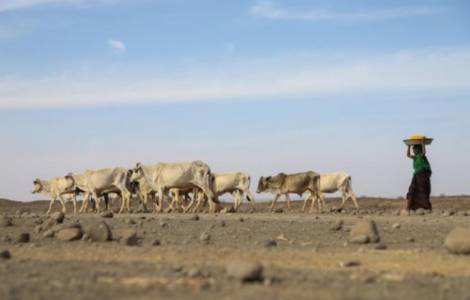
Ginir (Agenzia Fides) - "People are starving in our area and the situation continues to deteriorate rapidly. My health colleagues say that the increase in cases of acute malnutrition among children will only get worse. This is stated by a health worker at the Ginir hospital, in the Bale Oriental region of Ethiopia, affected by a severe drought along with Oromia, Somali region, Southern Nations and Southwest. Local media report that the population in these areas had just recovered from the 2017 drought and if rainfall expected for March-April 2022 remains below average, a fourth consecutive dry season will aggravate the situation. Political factors, such as an insufficient government response, the civil war in northern Ethiopia (see Fides, 18/1/2022) and instability in other regions, have exacerbated the environmental crisis. According to the local commission on disasters and displacement, in Oromia, more than 800,244 people in eight areas of the region are currently facing famine and drought. Among the main victims are children who currently suffer or are at risk of suffering from severe acute malnutrition in the coming months. Prolonged water scarcity has resulted in malnutrition, also through the loss of livestock. Projections from the United Nations Office for the Coordination of Humanitarian Affairs (UNOCHA) indicate that more than 6.8 million people are affected. In the Oromia and Somali region, an estimated 225,000 children are malnourished and more than 100,000 pregnant and breastfeeding women need nutritional support.
Since most of the region's population makes a living from livestock farming, the consequences of the drought, such as the drying up of pastures and depletion of water supplies, have seriously worsened the current food insecurity. In January 2022 alone, an estimated 260,000 head of cattle died in South Oromia, Somali Region and Southern Region. Another two million head of cattle are at risk, as a result the market value has also collapsed as the emaciated animals are not marketable. The federal administration has provided humanitarian aid to prevent an immediate catastrophe. As a long-term goal, it seems that the government plans to launch several water projects to avoid future droughts. (GF/AP) (Agenzia Fides, 21/2/2022)